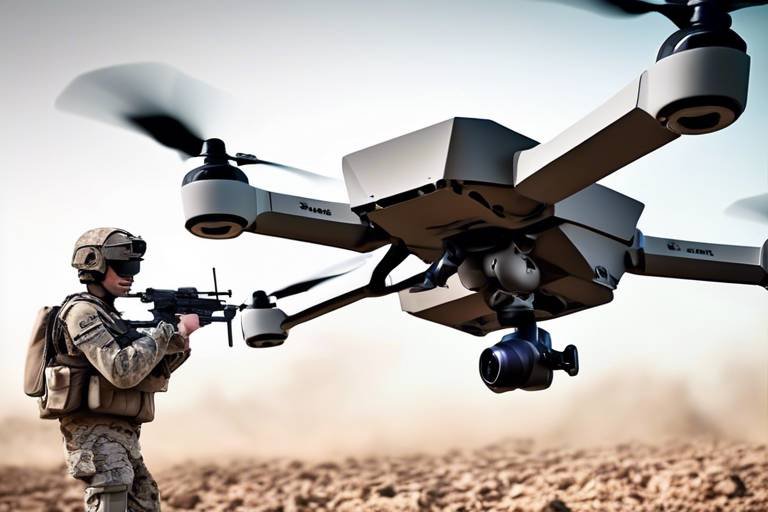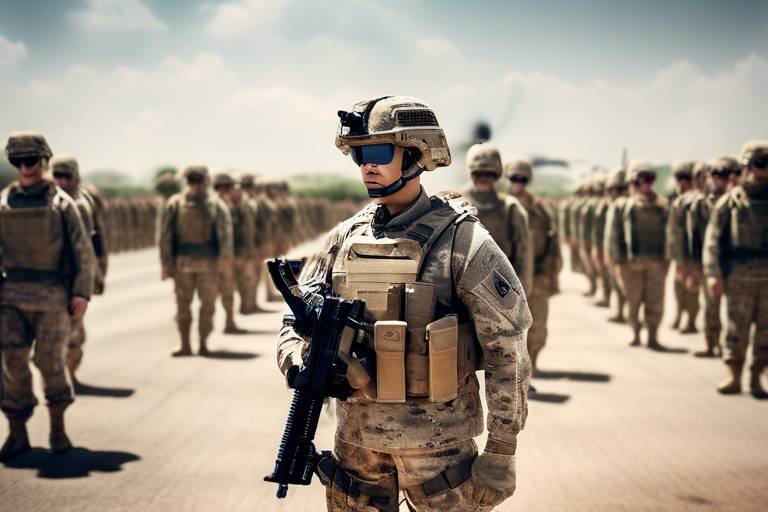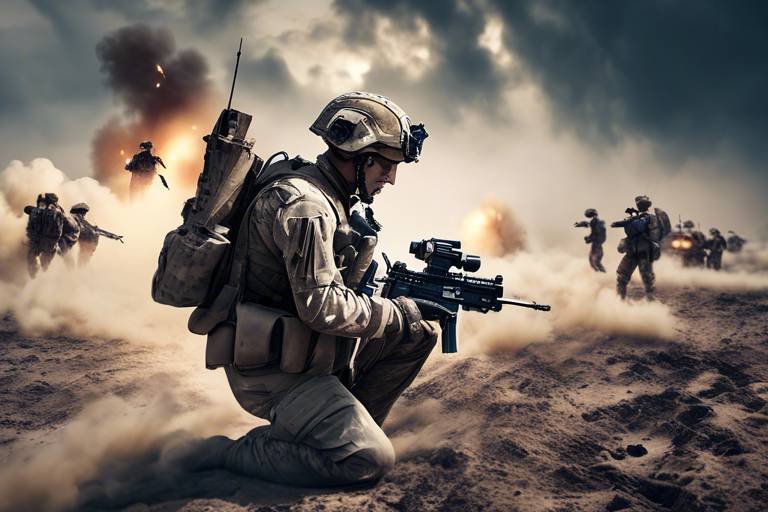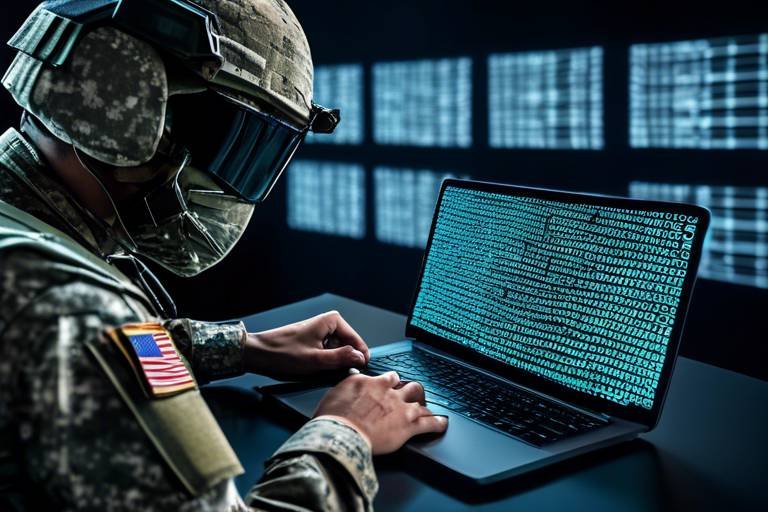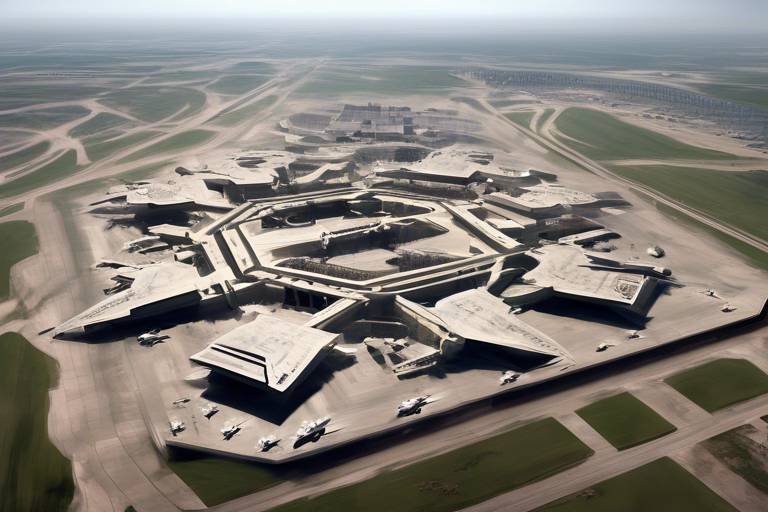Quantum Sensors in Battlefield Reconnaissance
In the ever-evolving landscape of military technology, quantum sensors are emerging as game-changers in battlefield reconnaissance. Imagine a world where soldiers can detect threats with pinpoint accuracy, where every movement on the ground is monitored in real-time, and where environmental changes are captured instantaneously. This isn’t science fiction; it’s the reality that quantum sensors are bringing to modern warfare. By leveraging the principles of quantum mechanics, these sensors provide unprecedented capabilities that can significantly enhance situational awareness on the battlefield.
So, what exactly are quantum sensors? At their core, they utilize the strange and fascinating principles of quantum mechanics to measure physical quantities with remarkable precision. This means that they can detect minute changes in their surroundings—something conventional sensors struggle to do. For instance, while traditional sensors might overlook subtle shifts in magnetic fields or gravitational waves, quantum sensors can pick up on these variations, providing military personnel with critical information that could mean the difference between success and failure in a mission.
Furthermore, the advantages of quantum sensors extend beyond just precision. They offer enhanced sensitivity, enabling them to operate effectively in challenging environments where other technologies might falter. Consider a scenario where visibility is low due to fog or smoke; quantum sensors can still provide accurate readings, ensuring that military operations continue unhindered. This capability is not just a theoretical benefit; it has real-world implications for how reconnaissance missions are conducted and how information is gathered and analyzed.
As we delve deeper into the specifics, it becomes clear that quantum sensors are not just an upgrade; they represent a paradigm shift in military reconnaissance. The ability to detect targets with high accuracy, monitor environmental conditions in real-time, and integrate seamlessly with existing military systems positions these sensors as indispensable tools for modern warfare. In the sections that follow, we will explore the various applications of quantum sensors on the battlefield, their integration challenges, and the future developments that lie ahead.
- What are quantum sensors? Quantum sensors are devices that use principles of quantum mechanics to measure physical quantities with high precision.
- How do quantum sensors improve military reconnaissance? They enhance sensitivity and accuracy, allowing for better target detection and environmental monitoring.
- What are some applications of quantum sensors in the military? Applications include surveillance operations, navigation, and environmental monitoring.
- What challenges do quantum sensors face? Challenges include integration with existing systems and operational limitations in deployment.

Understanding Quantum Sensors
Quantum sensors represent a groundbreaking leap in technology, leveraging the principles of quantum mechanics to achieve measurements that are not only precise but also incredibly sensitive. At their core, these sensors exploit the unique behaviors of quantum particles, such as superposition and entanglement, to gather data that traditional sensors simply cannot match. Imagine being able to detect the faintest signals in the environment, akin to hearing a whisper in a crowded room. That's the power of quantum sensing!
To understand how these devices work, we need to dive into some fundamental concepts. Quantum sensors operate on the principle that quantum states can exist in multiple configurations at once. This allows them to measure various physical quantities—like magnetic fields, gravitational waves, and temperature—with astonishing accuracy. For instance, a quantum sensor can measure the Earth's gravitational pull with a precision that is orders of magnitude greater than conventional gravimeters.
One of the most fascinating aspects of quantum sensors is their ability to outperform classical sensors in terms of noise reduction. Traditional sensors often struggle with background noise, which can obscure vital information. Quantum sensors, however, can utilize quantum correlations to filter out this noise, leading to clearer and more reliable data. This capability is particularly crucial in military reconnaissance, where the ability to detect subtle changes in the environment can mean the difference between success and failure in a mission.
Moreover, quantum sensors can be categorized into various types based on their operational principles, including:
- Atomic Clocks: These are the most precise timekeeping devices, which can be used for navigation and synchronization.
- Quantum Interferometers: These sensors measure minute changes in physical quantities by observing the interference patterns of light or matter waves.
- Quantum Magnetometers: These devices measure magnetic fields with exceptional sensitivity, useful for detecting submarines or hidden weapons.
As the field of quantum technology continues to evolve, researchers are exploring new materials and techniques to enhance the performance of quantum sensors. The integration of quantum dots and topological insulators into sensor designs could lead to even greater levels of sensitivity and functionality. In essence, the future of quantum sensors is not just about improving existing technologies but also about unlocking entirely new possibilities for measurement and data collection.
In conclusion, understanding quantum sensors is essential for grasping their potential impact on military reconnaissance and other fields. They are not just a technological novelty; they are set to redefine how we perceive and interact with the world around us. As we continue to uncover their capabilities, the applications for quantum sensors will only expand, promising a future where precision and accuracy are taken to unprecedented heights.

Advantages of Quantum Sensors
In the realm of military reconnaissance, quantum sensors are not just a technological upgrade; they represent a paradigm shift. These devices harness the peculiar principles of quantum mechanics, allowing them to outperform traditional sensing technologies in several critical aspects. One of the foremost advantages is their enhanced sensitivity. Unlike conventional sensors, which can be limited by noise and environmental interference, quantum sensors can detect minute changes in physical quantities. This remarkable sensitivity enables military forces to gather data with an accuracy that was previously unimaginable.
Furthermore, the accuracy of quantum sensors significantly elevates their utility in various military applications. Imagine being able to pinpoint the exact location of a target or detect the faintest signals amidst the chaos of the battlefield. This precision measurement capability is crucial for successful reconnaissance missions. For instance, in a scenario where troops are deployed in a densely forested area, quantum sensors can effectively identify hidden enemy positions or track movements without being detected themselves.
Another compelling benefit is the ability to perform real-time data analysis. Quantum sensors can process information almost instantaneously, providing commanders with up-to-the-minute intelligence. This rapid data processing is vital in fast-paced military operations where decisions need to be made in the blink of an eye. The integration of quantum sensors with advanced data analytics platforms can create a comprehensive situational awareness system, allowing military leaders to make informed decisions based on the most current information available.
Moreover, quantum sensors excel in environmental monitoring. The battlefield is not just a physical space; it is influenced by various environmental factors such as weather conditions and terrain changes. Quantum sensors can monitor these variables in real-time, providing critical insights that can affect operational strategies. For example, if a storm is brewing, commanders can adjust their plans accordingly, ensuring the safety and effectiveness of their troops.
To summarize, the advantages of quantum sensors can be categorized as follows:
- Enhanced Sensitivity: Detects minute changes that traditional sensors may miss.
- High Accuracy: Provides precise measurements essential for target identification.
- Real-Time Data Processing: Enables immediate analysis and decision-making.
- Environmental Monitoring: Offers insights into changing battlefield conditions.
As we continue to explore the potential of quantum sensors, it becomes clear that their integration into military operations is not just beneficial; it is becoming a necessity. The ability to gather and analyze data with such precision and speed could very well redefine modern warfare strategies, making quantum sensors a cornerstone of future military reconnaissance efforts.
Q1: What makes quantum sensors different from traditional sensors?
A1: Quantum sensors utilize the principles of quantum mechanics, allowing them to achieve higher sensitivity and accuracy compared to traditional sensors, which are often limited by noise and environmental factors.
Q2: How do quantum sensors enhance military operations?
A2: They provide precise measurements, real-time data analysis, and environmental monitoring, which are crucial for making informed decisions on the battlefield.
Q3: Are there any limitations to quantum sensors?
A3: Yes, despite their advantages, quantum sensors face challenges such as deployment difficulties and the need for specialized training to operate effectively.

Precision Measurement
When it comes to military reconnaissance, is not just a luxury; it's a necessity. Quantum sensors excel in this area, allowing for measurements that were once thought impossible. Imagine being able to detect minute changes in the environment or pinpoint the exact location of a target with extraordinary accuracy. This is where quantum sensors shine, utilizing the principles of quantum mechanics to gather data that traditional sensors simply cannot match.
One of the most striking features of quantum sensors is their ability to measure gravitational fields with incredible precision. This capability can be crucial in determining the location of underground structures, such as bunkers or tunnels, that may be used by enemy forces. By detecting variations in the gravitational field, military personnel can uncover hidden threats and gain a tactical advantage. Furthermore, these sensors can operate in various conditions, making them versatile tools for reconnaissance missions.
Additionally, quantum sensors can measure magnetic fields with remarkable sensitivity. This is particularly useful in detecting metallic objects, such as weaponry or vehicles, even when they are buried or concealed. The ability to discern these objects from a distance can significantly enhance operational planning and decision-making. For example, during a reconnaissance mission, a quantum sensor could identify the presence of enemy tanks hidden in a forest, allowing troops to strategize accordingly.
To better illustrate the capabilities of quantum sensors in precision measurement, consider the following table:
| Measurement Type | Traditional Sensors | Quantum Sensors |
|---|---|---|
| Gravitational Fields | Limited accuracy | High precision |
| Magnetic Fields | Moderate sensitivity | Exceptional sensitivity |
| Temperature Variations | Standard accuracy | Ultra-high sensitivity |
In summary, the precision measurement capabilities of quantum sensors significantly enhance military reconnaissance efforts. By providing accurate and detailed data, these sensors empower military forces to make informed decisions in real-time. Whether it's detecting hidden threats or monitoring environmental conditions, quantum sensors are transforming the landscape of battlefield intelligence.
- What are quantum sensors? Quantum sensors are devices that utilize principles of quantum mechanics to measure physical quantities with exceptional precision.
- How do quantum sensors improve military reconnaissance? They provide accurate data on environmental changes and detect hidden threats, allowing for better decision-making and strategy formulation.
- What are some examples of measurements made by quantum sensors? Quantum sensors can measure gravitational fields, magnetic fields, and temperature variations with high sensitivity.
- Are quantum sensors currently in use in military applications? Yes, quantum sensors are being developed and tested for various military applications, including reconnaissance and surveillance.

Target Detection
In the heat of battle, the ability to detect and identify targets swiftly can mean the difference between victory and defeat. Quantum sensors are revolutionizing this aspect of military operations by offering unparalleled capabilities in . Unlike traditional sensors that rely on classical physics, quantum sensors harness the peculiarities of quantum mechanics to enhance their sensitivity and accuracy. Imagine a world where troops can pinpoint enemy positions with laser-like precision, even in the most challenging environments!
One of the standout features of quantum sensors is their ability to detect minute changes in the environment. For instance, these sensors can pick up the faintest vibrations caused by footsteps or the subtle changes in magnetic fields from vehicles moving through the terrain. This level of detail allows military forces to build a comprehensive picture of the battlefield, identifying potential threats before they become imminent. Think of it as having an ultra-sensitive ear that can hear whispers in a noisy room—this is what quantum sensors bring to the table.
To illustrate the effectiveness of quantum sensors in target detection, consider the following applications:
- Advanced Imaging Techniques: Quantum sensors can enhance imaging systems, allowing for high-resolution images even in low-light conditions. This capability is crucial for nighttime operations when visibility is limited.
- Stealth Operations: With their ability to detect targets without emitting signals, quantum sensors can support stealth missions, providing intelligence without revealing the presence of friendly forces.
- Multi-Modal Detection: Quantum sensors can be integrated with other sensing technologies, such as infrared and radar, to create a multi-modal detection system that offers a more comprehensive understanding of the battlefield.
Moreover, the integration of quantum sensors into existing military frameworks can improve the speed and accuracy of target acquisition. By processing data in real-time, these sensors can alert commanders to potential threats almost instantaneously, allowing for rapid decision-making. This capability is akin to having a personal assistant who can sift through mountains of information and highlight the most critical points in a matter of seconds.
However, it's essential to acknowledge that while quantum sensors offer incredible advantages, they are not without challenges. Factors such as environmental interference and the need for specialized training to operate these advanced systems can pose hurdles. Nevertheless, the potential benefits far outweigh these challenges, paving the way for a new era in military reconnaissance.
- What are quantum sensors? Quantum sensors are devices that utilize principles of quantum mechanics to measure physical quantities with high precision, making them ideal for applications like target detection in military settings.
- How do quantum sensors improve target detection? They enhance target detection by detecting minute environmental changes and providing high-resolution imagery, even in challenging conditions.
- What are the challenges of using quantum sensors? Challenges include environmental interference, the need for specialized training, and integration with existing military systems.
- Can quantum sensors be used in civilian applications? Yes, while primarily focused on military use, quantum sensors have potential applications in fields like environmental monitoring, healthcare, and disaster response.

Environmental Monitoring
In the realm of military reconnaissance, plays a pivotal role in ensuring that troops are well-informed about the conditions surrounding them. The battlefield is not just a physical space; it is a complex environment influenced by various factors such as weather, terrain, and even human activity. Quantum sensors, with their ability to detect minute changes in the environment, are revolutionizing how military forces gather and interpret this vital data.
Imagine a scenario where a squad is deployed in a mountainous region, and they need to understand the weather patterns to make strategic decisions. Traditional sensors might provide data, but quantum sensors can offer a level of detail that is simply unmatched. They can measure atmospheric pressure, temperature fluctuations, and humidity with incredible precision, allowing military personnel to anticipate changes that could affect their operations. For instance, a sudden drop in temperature might indicate an approaching storm, which could impact visibility and troop movement.
Moreover, quantum sensors can monitor terrain changes that could signal enemy activity. By detecting shifts in ground vibrations or even subtle changes in the electromagnetic fields, these sensors can alert forces to the presence of vehicles or personnel nearby. This capability is particularly crucial in reconnaissance missions, where understanding the environment can mean the difference between success and failure.
To illustrate the impact of quantum sensors in environmental monitoring, consider the following table that summarizes their key advantages:
| Feature | Quantum Sensors | Traditional Sensors |
|---|---|---|
| Sensitivity | High sensitivity to minute changes | Lower sensitivity |
| Data Collection | Real-time data acquisition | Delayed data reporting |
| Environmental Impact | Minimal disruption to the environment | Potentially invasive |
| Operational Range | Effective in diverse conditions | Limited effectiveness in adverse conditions |
In addition to weather and terrain monitoring, quantum sensors can also be utilized to assess chemical and biological threats. By detecting trace amounts of hazardous substances in the air or on the ground, these sensors can provide early warnings of potential dangers, allowing military forces to take necessary precautions. This capability is particularly important in modern warfare, where the threat of chemical and biological weapons is ever-present.
As we look to the future, the integration of quantum sensors into military reconnaissance systems will undoubtedly enhance the ability to monitor environmental conditions. This innovation not only improves situational awareness but also contributes to the overall safety and effectiveness of military operations. With quantum sensors, the battlefield becomes a more navigable and predictable environment, allowing for better strategic planning and execution.
- What are quantum sensors? Quantum sensors are devices that utilize principles of quantum mechanics to measure physical quantities with high precision.
- How do quantum sensors improve environmental monitoring? They provide enhanced sensitivity and real-time data collection, allowing for better understanding of atmospheric and terrain changes.
- Can quantum sensors detect chemical threats? Yes, they can identify trace amounts of hazardous substances, providing early warnings of potential dangers.
- What advantages do quantum sensors have over traditional sensors? Quantum sensors offer higher sensitivity, real-time data acquisition, minimal environmental impact, and effectiveness in diverse conditions.

Integration with Existing Systems
Integrating quantum sensors with existing military systems is not just a technical challenge; it's a strategic necessity. As the battlefield grows increasingly complex, the need for seamless integration of advanced technologies becomes paramount. Imagine a world where quantum sensors work in harmony with traditional reconnaissance tools, enhancing their capabilities and providing a richer tapestry of data. This integration can lead to improved situational awareness, faster decision-making, and ultimately, more successful missions.
One of the primary considerations in this integration process is the compatibility of quantum sensors with current military hardware and software. Many existing systems rely on conventional sensors, which operate on different principles and data formats. To bridge this gap, military engineers must develop interfacing protocols that allow quantum sensors to communicate effectively with these legacy systems. This might involve creating middleware that translates quantum sensor data into formats that existing systems can interpret.
Moreover, training personnel to understand and operate these advanced sensors is crucial. Military operators accustomed to traditional systems may find it challenging to adapt to the intricacies of quantum technology. Therefore, comprehensive training programs must be established, focusing on the unique features of quantum sensors and how they can be effectively utilized in conjunction with existing tools. This could include
- Workshops on quantum mechanics fundamentals
- Hands-on training with quantum sensor equipment
- Simulations of battlefield scenarios using integrated systems
Another critical aspect of integration is addressing the data management challenges that arise from the vast amounts of information generated by quantum sensors. These sensors can provide data with unprecedented precision and volume, which can overwhelm existing data processing systems. To combat this, military organizations may need to invest in advanced data analytics platforms capable of handling and interpreting quantum data efficiently. This could involve the use of machine learning algorithms that can sift through the noise and highlight actionable intelligence.
Furthermore, integrating quantum sensors into existing systems also raises questions about cybersecurity. As with any technology, the risk of cyber threats increases when new systems are introduced. To safeguard sensitive military data, robust security measures must be implemented, ensuring that quantum sensor networks are protected from potential breaches. This may involve encrypting data transmissions and establishing secure communication channels to protect against interception.
In conclusion, while the integration of quantum sensors with existing military systems presents challenges, the potential benefits are immense. By overcoming compatibility issues, providing adequate training, enhancing data management processes, and ensuring cybersecurity, military forces can unlock the full potential of quantum sensing technology. The result will be a more agile, informed, and effective military operation, capable of adapting to the ever-evolving landscape of modern warfare.
- What are quantum sensors? Quantum sensors are devices that utilize principles of quantum mechanics to measure physical quantities with extreme precision, far surpassing traditional sensors.
- How do quantum sensors integrate with existing military systems? Integration involves developing interfacing protocols, training personnel, enhancing data management capabilities, and ensuring cybersecurity.
- What challenges are associated with integrating quantum sensors? Challenges include compatibility with legacy systems, the need for specialized training, managing large volumes of data, and addressing cybersecurity risks.
- What benefits do quantum sensors offer in military applications? They provide enhanced sensitivity, accuracy, and the ability to detect and monitor targets and environmental conditions in real-time, significantly improving situational awareness.
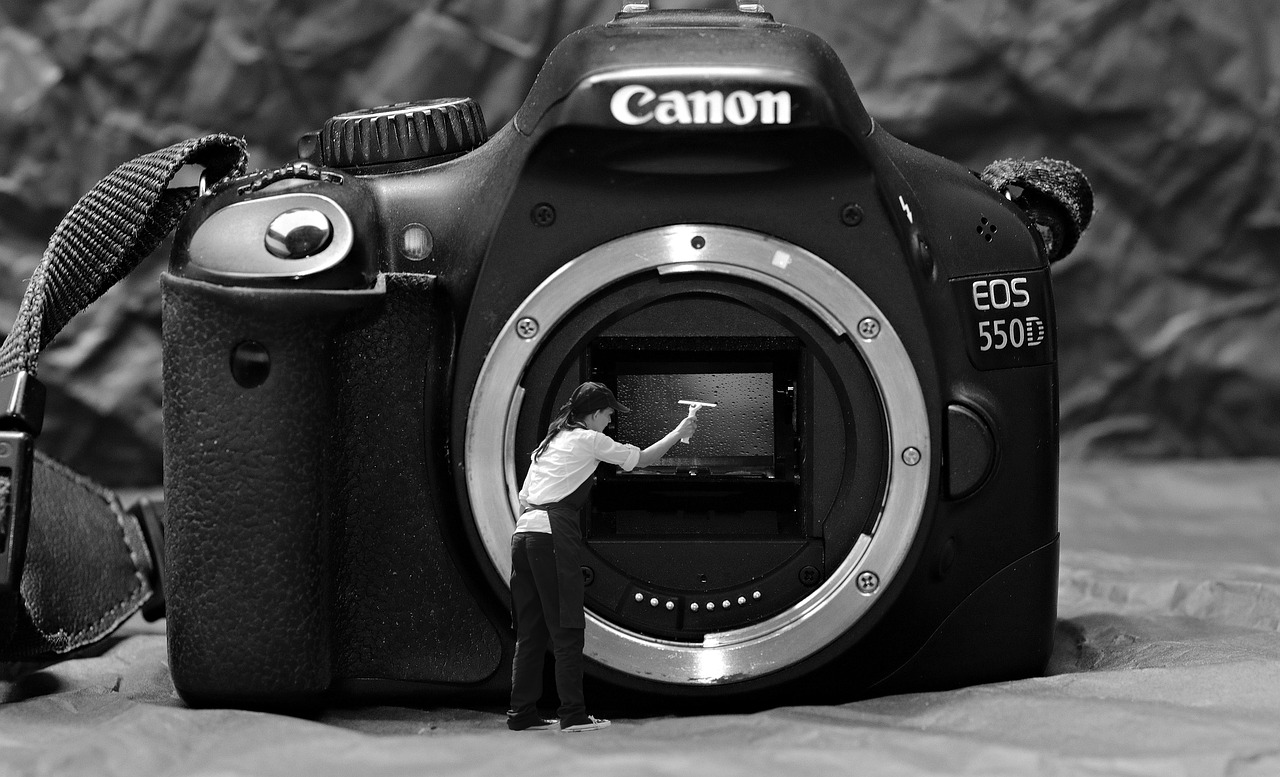
Applications in Battlefield Scenarios
In the rapidly evolving landscape of military operations, quantum sensors are emerging as game-changers, significantly enhancing battlefield scenarios. These sensors are not just a technological novelty; they are redefining how military forces gather intelligence, navigate, and respond to threats. Imagine a world where every movement is tracked with pinpoint accuracy and every environmental change is detected in real-time. This is not science fiction; it's the reality that quantum sensors are bringing to modern warfare.
One of the primary applications of quantum sensors is in surveillance operations. Traditional surveillance methods often rely on outdated technologies that can be easily evaded or compromised. In contrast, quantum sensors provide a level of detail and reliability that is unparalleled. For instance, they can detect minute changes in electromagnetic fields, allowing military personnel to monitor enemy movements without being detected. This capability is crucial for maintaining an upper hand in intelligence gathering. By using quantum sensors, military forces can enhance their situational awareness, allowing them to assess threats more accurately and respond swiftly.
Another significant application lies in navigation and positioning. Accurate navigation is vital for military operations, especially in unfamiliar or hostile territories. Quantum sensors, with their ability to provide precise location data, can revolutionize how troops maneuver on the battlefield. They can improve GPS systems by offering resistance against jamming and spoofing, which are common tactics employed by adversaries. This means that soldiers can navigate effectively without the fear of losing their way or falling into traps set by enemy forces.
Moreover, quantum sensors can be instrumental in environmental monitoring. The battlefield is not just a physical space; it is influenced by various environmental factors that can impact military operations. Quantum sensors can provide real-time data on atmospheric conditions, such as temperature, humidity, and pressure, which are crucial for planning operations. For example, understanding wind patterns can aid in the effective deployment of drones or missile systems. Additionally, they can monitor terrain changes, such as land shifts or the presence of obstacles, ensuring that troops are always prepared for the unexpected.
To illustrate the multifaceted applications of quantum sensors in battlefield scenarios, consider the following table that summarizes their key roles:
| Application | Description | Benefits |
|---|---|---|
| Surveillance Operations | Real-time monitoring of enemy movements and activities. | Enhanced situational awareness and threat assessment. |
| Navigation and Positioning | Precise location tracking and navigation assistance. | Improved troop maneuverability and reduced risk of disorientation. |
| Environmental Monitoring | Assessment of atmospheric and terrain conditions. | Better operational planning and adaptability to changing environments. |
As military operations become more complex, the integration of quantum sensors into existing systems is becoming essential. The ability to gather and analyze data in real-time allows military leaders to make informed decisions quickly. In this fast-paced environment, having the upper hand in intelligence and situational awareness can mean the difference between success and failure on the battlefield.
In conclusion, the applications of quantum sensors in battlefield scenarios are vast and varied. From enhancing surveillance and navigation to monitoring environmental conditions, these technologies are paving the way for a new era in military operations. As we look to the future, it’s clear that the integration of quantum sensors will be crucial for maintaining a strategic advantage in warfare.
- What are quantum sensors? Quantum sensors utilize principles of quantum mechanics to measure physical quantities with extreme precision.
- How do quantum sensors improve surveillance? They provide detailed and reliable data on enemy movements, enhancing situational awareness and threat assessment.
- Can quantum sensors be integrated with existing military systems? Yes, integrating quantum sensors with current systems is essential for maximizing their effectiveness, although challenges may arise during implementation.
- What are the benefits of using quantum sensors for navigation? They offer precise location tracking, improving troop maneuverability and reducing risks associated with traditional navigation methods.

Surveillance Operations
In the realm of military operations, surveillance is not just a necessity; it’s a lifeline. The success of missions often hinges on the quality of intelligence gathered before and during operations. Enter quantum sensors, a game-changer that elevates surveillance capabilities to an unprecedented level. These sensors harness the unique properties of quantum mechanics to detect and analyze minute changes in the environment, providing military forces with critical insights that were previously unimaginable.
Imagine being able to detect the faintest vibrations or minute temperature fluctuations that could indicate the presence of enemy troops or equipment. Quantum sensors make this possible. They operate on principles that allow them to measure physical quantities with astonishing precision, which is crucial in surveillance operations. For instance, by utilizing quantum entanglement, these sensors can achieve sensitivity levels that far exceed traditional technologies. This means that military personnel can gather actionable intelligence more quickly and accurately, reducing the risk of errors that could jeopardize missions.
Moreover, the integration of quantum sensors into surveillance systems can revolutionize the way military forces monitor battlefield dynamics. They can be deployed in various forms, including drones, ground sensors, and even satellites, enabling a multi-dimensional approach to surveillance. The ability to collect real-time data allows commanders to make informed decisions based on the most current information available. This not only enhances situational awareness but also increases the overall effectiveness of military operations.
To illustrate the potential of quantum sensors in surveillance, consider the following key benefits:
- Enhanced Detection Capabilities: Quantum sensors can identify threats that might go unnoticed by conventional systems, such as hidden enemy positions or camouflaged vehicles.
- Real-Time Data Processing: The rapid processing of data allows military units to react promptly to emerging threats, significantly improving response times.
- Reduced Detection Footprint: Quantum sensors can operate with minimal energy, making them less detectable and allowing for covert operations.
Furthermore, the data collected by quantum sensors can be integrated with artificial intelligence systems to enhance analysis and decision-making. By employing machine learning algorithms, military analysts can sift through vast amounts of data to identify patterns and predict enemy movements. This synergy between quantum sensing and AI can lead to a new era of intelligent surveillance, where military forces are always one step ahead of their adversaries.
However, the implementation of quantum sensors in surveillance operations is not without its challenges. The technology is still in its nascent stages, and there are hurdles related to cost, training, and integration with existing systems. Nevertheless, the potential benefits far outweigh these challenges, making quantum sensors an essential component of future military strategies.
As we look to the future, the role of quantum sensors in surveillance operations is poised to expand even further. Innovations in this field could lead to more advanced sensing capabilities, enabling military forces to operate in increasingly complex environments with greater efficiency. The battlefield of tomorrow will undoubtedly be shaped by the insights provided by these remarkable technologies.
- What are quantum sensors? Quantum sensors are devices that utilize the principles of quantum mechanics to measure physical quantities with high precision.
- How do quantum sensors improve surveillance? They enhance detection capabilities, provide real-time data, and reduce the likelihood of being detected themselves.
- What challenges do quantum sensors face in military applications? Challenges include high costs, the need for specialized training, and integration with existing military systems.

Navigation and Positioning
Accurate navigation is the backbone of successful military operations, and when it comes to battlefield scenarios, the stakes couldn't be higher. Imagine a scenario where troops are maneuvering through hostile territory, and every second counts. In such situations, quantum sensors step in as game-changers, enhancing positioning systems to ensure that military forces can navigate with pinpoint precision.
Quantum sensors utilize the principles of quantum mechanics to provide data that is not only accurate but also remarkably reliable. Unlike traditional GPS systems, which can be vulnerable to jamming or interference, quantum sensors offer a level of resilience that is crucial in modern warfare. These sensors are capable of measuring gravitational fields and magnetic variations with extreme sensitivity, allowing for a new way to determine location and orientation.
One of the standout features of quantum sensors in navigation is their ability to function effectively in environments where conventional systems falter. For example, in dense urban settings or mountainous terrains, where GPS signals may be obstructed, quantum sensors can still provide accurate positioning data. This capability is essential for troops who need to maintain situational awareness and coordinate their movements without being detected by the enemy.
To illustrate the advantages of quantum sensors in navigation, consider the following table that highlights their key benefits compared to traditional navigation systems:
| Feature | Quantum Sensors | Traditional Systems |
|---|---|---|
| Signal Interference | Highly resistant to jamming | Vulnerable to interference |
| Accuracy | Sub-meter precision | Meter-level precision |
| Environmental Adaptability | Effective in complex terrains | Limited effectiveness in urban areas |
| Data Reliability | Consistent performance | Subject to signal loss |
Moreover, the integration of quantum sensors into navigation systems can facilitate advanced algorithms that process real-time data, allowing military units to adapt dynamically to changing battlefield conditions. This adaptability is akin to having a skilled navigator who can read the winds and currents, guiding troops safely through the chaos of war.
As we look toward the future, the potential applications of quantum sensors in navigation are boundless. They can be integrated with drones for aerial reconnaissance, enhancing the capabilities of unmanned systems to navigate autonomously through hostile environments. Additionally, they can support ground troops by providing real-time updates on their positioning relative to enemy forces, thus improving tactical decision-making.
In conclusion, the role of quantum sensors in navigation and positioning cannot be overstated. They are not just a technological advancement; they represent a fundamental shift in how military operations can be conducted with greater accuracy, reliability, and safety. As these technologies continue to evolve, we can expect to see even more innovative applications that will redefine the landscape of military reconnaissance.
- What are quantum sensors? Quantum sensors are devices that utilize quantum mechanics principles to measure physical quantities with extreme precision.
- How do quantum sensors improve navigation? They provide highly accurate positioning data that is resilient to jamming and interference, especially in challenging environments.
- Can quantum sensors be used in urban warfare? Yes, they are particularly effective in urban settings where traditional GPS systems may struggle.
- What is the future of quantum sensing in military applications? The future holds exciting possibilities, including integration with drones and enhanced real-time data processing for improved tactical decisions.

Future Developments in Quantum Sensing
The future of quantum sensing technology is not just bright; it’s practically blinding! As we stand on the brink of a technological revolution, the potential advancements in quantum sensors promise to reshape military reconnaissance in ways we can only begin to imagine. These sensors, which leverage the peculiar principles of quantum mechanics, are poised to deliver unprecedented levels of precision, sensitivity, and operational efficiency. What does this mean for the battlefield? Well, let’s dive into the exciting possibilities!
One of the most thrilling prospects in quantum sensing is the development of quantum networks. Imagine a system of interconnected quantum sensors that can communicate and share data in real-time across vast distances. This could lead to a new era of situational awareness where military operatives can access comprehensive battlefield data at lightning speed. Such networks would not only improve the accuracy of reconnaissance missions but also enhance decision-making processes by providing commanders with a holistic view of the battlefield.
Moreover, researchers are exploring miniaturization techniques that could allow quantum sensors to be deployed in smaller, more versatile formats. The idea of having tiny devices embedded in drones or even wearable technology for soldiers is incredibly intriguing. These compact sensors could monitor environmental conditions, detect enemy movements, and provide critical data without compromising the mobility of troops. It’s like having a high-tech Swiss Army knife at your disposal!
Another area ripe for innovation is in machine learning integration. As quantum sensors collect vast amounts of data, the ability to analyze and interpret this information quickly becomes paramount. By employing advanced algorithms and artificial intelligence, military forces can sift through data more efficiently, identifying patterns and threats that might otherwise go unnoticed. This fusion of quantum sensing and AI could lead to predictive analytics, allowing for proactive measures rather than reactive responses.
However, with great power comes great responsibility. The deployment of quantum sensors also raises important questions about security and ethics. As these technologies evolve, so too do the potential risks associated with their misuse. Military leaders and policymakers must navigate the complexities of ensuring that quantum advancements are used responsibly and do not infringe upon privacy or lead to unintended consequences.
To put it simply, the future of quantum sensing in military applications is not just about enhancing capabilities; it’s about redefining how we approach warfare altogether. The potential for improved reconnaissance, better decision-making, and enhanced safety for military personnel is immense. But as we forge ahead, it’s crucial to remain vigilant about the ethical implications of these powerful technologies.
- What are quantum sensors? Quantum sensors are devices that utilize the principles of quantum mechanics to measure physical quantities with exceptional precision.
- How do quantum sensors improve military reconnaissance? They enhance sensitivity and accuracy, allowing for better target detection, environmental monitoring, and data collection.
- What are the future developments in quantum sensing? Future developments include quantum networks, miniaturization of sensors, and integration with machine learning for advanced data analysis.
- What challenges do quantum sensors face? Challenges include deployment difficulties, operational limitations, and ethical concerns regarding their use in military applications.

Emerging Technologies
As we delve into the realm of quantum sensing, it's impossible to ignore the wave of that are reshaping military reconnaissance. The evolution of these technologies is akin to watching a master chef create a gourmet dish—each ingredient plays a crucial role in enhancing the overall flavor. In this case, the 'ingredients' include advancements in quantum computing, innovative materials, and sophisticated algorithms that work together to elevate the capabilities of quantum sensors.
One of the most exciting developments is the integration of quantum computing with sensing technologies. Quantum computers can process vast amounts of data at lightning speeds, enabling real-time analysis of the information gathered by sensors. Imagine a battlefield where every movement is tracked and analyzed instantaneously—this is the power of quantum computing in action. It allows military strategists to make decisions based on accurate, up-to-the-minute data, significantly enhancing situational awareness.
Moreover, the use of novel materials in the fabrication of quantum sensors is revolutionizing their performance. Researchers are exploring materials that exhibit unique quantum properties, such as topological insulators and superconductors. These materials can improve the sensitivity and accuracy of sensors, allowing them to detect even the faintest signals from the environment. For instance, a quantum sensor made from a topological insulator can measure magnetic fields with unprecedented precision, making it invaluable for detecting hidden threats.
Additionally, advancements in machine learning algorithms are enhancing the data interpretation capabilities of quantum sensors. By employing artificial intelligence, military operations can analyze complex datasets more efficiently. For example, machine learning can help identify patterns in environmental data, allowing for better predictions of enemy movements or environmental changes. This synergy between quantum sensors and AI creates a formidable tool for reconnaissance, akin to having a seasoned detective analyze clues in real-time.
In summary, the landscape of quantum sensing is rapidly evolving, driven by these emerging technologies. As these advancements continue to unfold, we can expect a transformation in how military forces approach reconnaissance. The integration of quantum computing, innovative materials, and machine learning will not only enhance the capabilities of quantum sensors but also redefine the very essence of battlefield awareness.
- What are quantum sensors?
Quantum sensors are devices that utilize the principles of quantum mechanics to measure physical quantities with high precision. - How do quantum sensors improve military reconnaissance?
They provide enhanced sensitivity and accuracy, enabling better target detection and environmental monitoring. - What emerging technologies are influencing quantum sensing?
Advancements in quantum computing, novel materials, and machine learning algorithms are significantly enhancing quantum sensing capabilities. - Can quantum sensors be integrated with existing military systems?
Yes, integrating quantum sensors with current technology is essential for maximizing their effectiveness, although it presents some challenges.

Challenges and Limitations
While the potential of quantum sensors in military reconnaissance is undeniably exciting, there are several that must be addressed before these technologies can be fully integrated into military operations. One of the primary hurdles is the cost associated with the development and deployment of quantum sensors. These devices require highly specialized materials and manufacturing processes, which can lead to significant financial investments. As a result, many military organizations may hesitate to adopt these advanced technologies due to budget constraints.
Another challenge lies in the environmental sensitivity of quantum sensors. These devices often rely on delicate quantum states that can be easily disturbed by external factors such as temperature fluctuations, electromagnetic interference, or even vibrations. This sensitivity means that quantum sensors may not perform optimally in all operational environments, limiting their effectiveness in certain battlefield conditions. For instance, deploying these sensors in harsh terrains or areas with high levels of electronic noise could compromise their performance.
Moreover, the integration of quantum sensors with existing military systems poses a significant challenge. Military organizations often rely on a variety of established technologies, and merging these with cutting-edge quantum sensors can be complex. The need for compatibility and interoperability between systems can result in lengthy development timelines and increased logistical challenges. Additionally, training personnel to effectively operate and maintain quantum sensors adds another layer of complexity to their implementation.
Lastly, there is a knowledge gap in the military regarding quantum technologies. Many military personnel may not have the necessary training or understanding of quantum mechanics to utilize these sensors effectively. This lack of expertise could hinder the operational benefits that quantum sensors promise. Addressing this knowledge gap will require significant investment in training programs and educational resources.
In summary, while quantum sensors hold immense promise for enhancing military reconnaissance, their deployment is not without challenges. From high costs and environmental sensitivity to integration issues and a lack of expertise, overcoming these limitations will be crucial for realizing the full potential of quantum sensing technologies in the battlefield.
- What are quantum sensors? Quantum sensors are devices that use the principles of quantum mechanics to measure physical quantities with exceptional precision.
- What are the main advantages of quantum sensors? They offer enhanced sensitivity, accuracy, and the ability to perform precision measurements, making them invaluable for military applications.
- How do environmental factors affect quantum sensors? Quantum sensors are sensitive to environmental changes, such as temperature and electromagnetic interference, which can impact their performance.
- What challenges do military organizations face when integrating quantum sensors? Challenges include high costs, environmental sensitivity, integration with existing systems, and a lack of trained personnel.
- What future developments can we expect in quantum sensing technology? Emerging technologies may lead to more robust quantum sensors that can withstand challenging conditions and improve military applications.
Frequently Asked Questions
- What are quantum sensors?
Quantum sensors are advanced devices that leverage the principles of quantum mechanics to measure physical quantities like time, temperature, and magnetic fields with exceptional precision. Unlike traditional sensors, they can detect minute changes in their environment, making them highly valuable in military applications.
- How do quantum sensors improve battlefield reconnaissance?
Quantum sensors enhance battlefield reconnaissance by providing highly accurate and sensitive data. This allows military forces to gather real-time intelligence, detect threats more effectively, and monitor environmental conditions, which is crucial for strategic decision-making in combat scenarios.
- What advantages do quantum sensors have over traditional sensors?
Quantum sensors offer several advantages, including:
- Higher Sensitivity: They can detect changes that are undetectable by conventional sensors.
- Improved Accuracy: Quantum sensors provide more precise measurements, leading to better data quality.
- Real-Time Data: They can deliver immediate feedback on environmental conditions, aiding in rapid response.
- Can quantum sensors be integrated with existing military systems?
Yes, integrating quantum sensors with existing military systems is essential for maximizing their effectiveness. However, this integration may pose challenges, such as compatibility issues and the need for updated training for personnel. Addressing these challenges is crucial for successful implementation.
- What are some applications of quantum sensors in military operations?
Quantum sensors have a wide range of applications in military operations, including:
- Surveillance: They enhance situational awareness by providing critical intelligence on enemy movements.
- Navigation: Quantum sensors improve positioning systems, ensuring troops can navigate accurately on the battlefield.
- Environmental Monitoring: They offer real-time data on atmospheric and terrain changes, which is vital for mission planning.
- What are the future prospects for quantum sensing technology?
The future of quantum sensing technology looks promising, with ongoing research leading to emerging technologies that could revolutionize military applications. However, challenges such as deployment limitations and operational hurdles need to be addressed to fully harness their potential.


